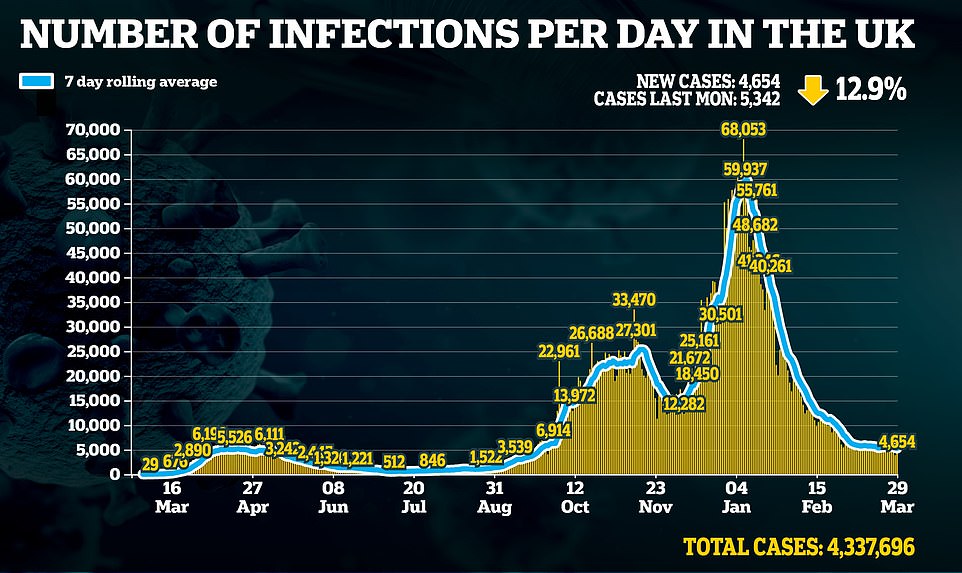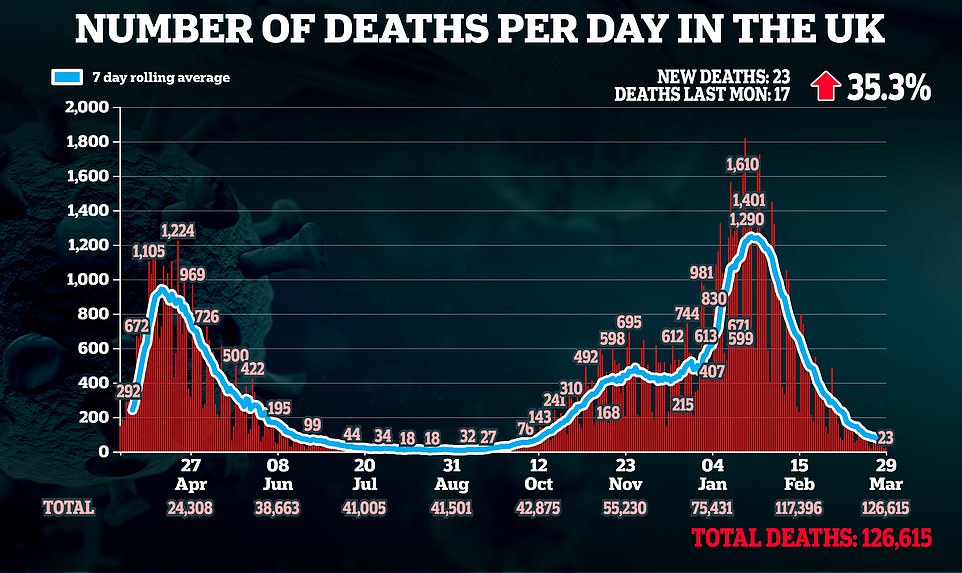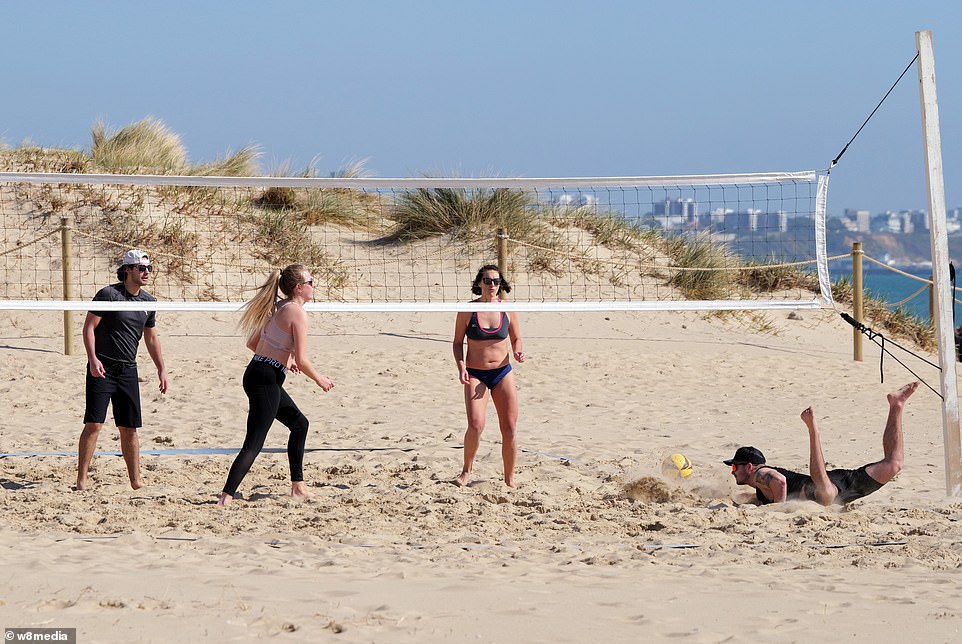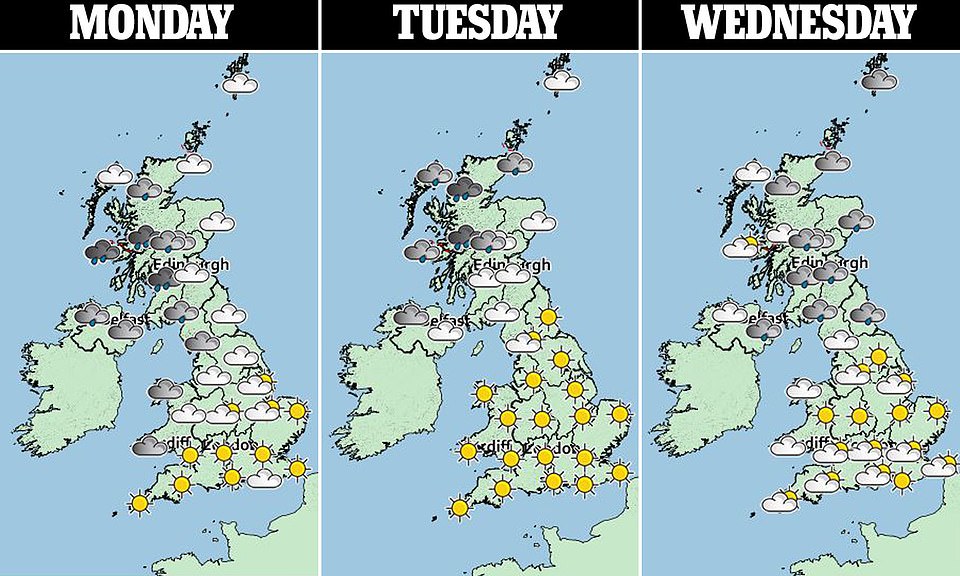Britain’s Covid cases drop by 13% in a week to 4,654 while deaths rise slightly to 23
- Department of Health’s official fatality toll relies on registrations, meaning day-to-day counts can fluctuate
- Experts would be baffled by any genuine spike in deaths because infections have not spiralled out of control
- It comes as Boris Johnson warned Britons ‘don’t risk the progress we’ve made’ as England unlocked further
Britain’s daily Covid cases have dropped 13 per cent in a week with 4,654 more infections today, official figures have revealed.
Deaths have risen slightly to 23 — up from 17 last Monday. But the Department of Health’s official fatality toll relies on registrations, meaning day-to-day counts can fluctuate.
Experts would be baffled by any genuine spike in deaths because infection rates have not spiralled out of control since schools in England reopened on March 8. The mammoth vaccine drive, which has now reached 30.4million vulnerable adults, will also save thousands of lives.
It comes as Boris Johnson today warned Britons ‘don’t risk the progress we’ve made’, as England stepped out of lockdown straight into a three-day spring heatwave, with temperatures hitting 66.2F (24C) this afternoon and a predicted 76F tomorrow and Wednesday – just shy of the all-time record of 78F.
The Prime Minister said it was ‘vital’ to continue abiding by social distancing rules as millions began to gather in parks, pools and sports venues to mark the first major easing of restrictions this year.


In other Covid news:
- Pfizer says it plans to drastically ramp up production and is prepared to break with German firm it partnered with on breakthrough vaccine;
- Health workers are 90 per cent less likely to catch Covid after they receive two doses, according to US-based study on Pfizer and Moderna jabs;
- Fewer than 60 per cent of black Britons over-70 have had their Covid vaccine, while the rate is 91 per cent among white adults, ONS data reveals;
- Wetherspoons boss Tim Martin says jabs passports would be the ‘last straw’ for many struggling pubs;
- And amid loosening lockdown restrictions to allow three people from two households to meet, the Government confirms long-distance trips to the seaside are allowed;
- France won’t be added to the UK’s ‘red list’ of travel countries from which arrivals are subject to hotel quarantine rules, it has been claimed;
- Matt Hancock says trips abroad ‘may well’ happen this summer sparking hope getaways will still be allowed.
As of today — six people, or two full households — are allowed to meet outside, including in back gardens, for the first time in four months, while the Government’s ‘stay at home’ rule has been replaced with ‘stay local’.
People have also been quick to take advantage of the reintroduction of outdoor sports, with golfers, tennis players and outdoor swimmers already out in force.
Weddings can also go ahead, and Ben and Gabriela Lloyd were the first couple to get married at St Albans registry office today.
But Professor Sir Mark Walport, former chief scientific adviser to the Government, warned people against hugging, saying they would only be able to do so again when case numbers are ‘very, very low’.
No10 has confirmed families can head to the beach or other beauty spots to bask in the late-March sunshine with no limit on the distance they can travel, although Matt Hancock urged people to try to stay local.
Meanwhile, Tourism Minister Nigel Huddleston suggested police would still hand out fines for large gatherings but will take a more relaxed stance for private gardens, as officials launched a new slogan, ‘Hands, face, space… and fresh air’.
In a video this morning, the PM stressed that ‘we must remain cautious, with cases rising across Europe and new variants threatening our vaccine rollout’ as the latest step on his road map out of lockdown was reached.
‘Despite today’s easements, everyone must continue to stick to the rules, remember hands, face, space, and come forward for a vaccine when called… don’t risk the process we’ve made.’
But critics have said lockdown should now be eased even faster than planned with half the population now having their first jab and Covid cases at the lowest levels since last summer and number of deaths in London hitting zero for the first time in months.
In Wales, the ‘stay local’ order ended on Saturday and people are now allowed to stay in self-contained holiday accommodation. The stay home order in Scotland is to end on Friday, while in Northern Ireland up to six people, or two households regardless of size, can meet outdoors from Thursday.

People enjoy the weather on sunny Sandbanks beach in Dorset as a group of four people play volleyball on the sand

It comes as Britons are expected to flock to beaches to enjoy this week’s mini-heatwave, after the Government confirmed families from London and elsewhere can now travel to the seaside.
People in England will be taking advantage of the relaxation of lockdown measures as outdoor gatherings and sport events resume, with highs of 66F (19C) expected in the South East today and 75F (24C) tomorrow.
There is now no legal limit on how far people can travel to enjoy day trips at the countryside or coastline, although overnight stays are still banned at hotels, self-catering accommodation and other people’s homes.
But there will be concerns among ministers that the unseasonably warm weather will make social distancing very tricky on beaches after the likes of Brighton and Bournemouth were swamped with visitors last summer.
The Government’s ‘stay at home’ order ended this morning, with messaging moving to ‘stay local’, but people are still being asked to continue to work from home where possible and overseas travel remains banned.
Government officials today confirmed to the Evening Standard that it is now legal to travel from London to the seaside for a day on the beach, and there is no limit on the distance you can travel to see friends or family.
The newspaper also put two examples to the Government, which it confirmed were acceptable. These were driving to the New Forest in Hampshire to ride a trial, or taking a windsurfer or kayak to the coast for the day.
A Government spokesman said: ‘Whilst the ‘stay at home’ rule has ended, many restrictions remain in place. We ask everyone to act responsibly and cautiously and minimise travel where possible as these restrictions ease.’
Temperatures in parts of the UK are expected to be significantly warmer this week as families and friends are reunited and sporting activities are allowed to resume in England.
Pfizer also confirmed today it would drastically ramp up its vaccine production capacity and was prepared to dump the German partner it worked on the breakthrough jab with.
The US drugs giant has revealed plans to use gene-based technology, harnessed by BioNTech, to tackle other viruses and illnesses beyond Covid.
Pfizer’s boss claimed the firm had learned enough about mRNA vaccines to go solo, adding that it no longer ‘needs to work with BioNTech’ beyond the end of the companies’ flu jab agreement in July.
Albert Bourla, the firm’s chief executive, revealed the company had recruited at least 50 more scientists to work out of its new mRNA-focused lab in New York.
It has also secured specialised raw materials and designed clinical trials so that it can manufacture and study vaccines without splitting profits.
Mr Bourla told the Wall Street Journal: ‘We like working with BioNTech, but we don’t need to work with BioNTech. We have our own expertise developed.’
The German company was the brains behind the Covid jab, which was proven to be 95 per cent effective at blocking Covid symptoms and became the first in the world to get approval in December when Britain gave it the green light.
Pfizer, most famous for inventing Viagra, came on board to manufacture, distribute and commercialise the vaccine.
The two companies are currently splitting profits on the Covid jab evenly, with sales expected to return roughly £13billion this year.
BioNTech seemed unaffected by the news in a statement and said it welcomed the ‘acknowledgement’ of the technology it had developed.
